'It's very hard to talk about Palestine to Jewish people – they see me as a betrayer,' says British actor Miriam Margolyes  Miriam Margolyes, who plays Professor Sprout in the Harry Potter films, with retired Palestinian farmer Said Ali Banat Hajarah. Photograph: Claudia Janke Miriam Margolyes, who plays Professor Sprout in the Harry Potter films, with retired Palestinian farmer Said Ali Banat Hajarah. Photograph: Claudia Janke In a small, bare room in a refugee camp in the southern West Bank, a Palestinian Muslim man and a British Jewish woman face each other on plastic chairs and grope towards a mutual understanding across decades of mistrust, injustice, hostility and violence. The man is Said Ali Banat Hajarah: 82, partially deaf, failing eyesight, a former farmer nostalgic about his fields and livestock, bitter at the loss of his family home more than six decades ago, still grieving the deaths of his father and a son at the hands of Israeli soldiers, convinced that the gun must be part of the toolbox of resistance alongside the pen and the voice. The woman is Miriam Margolyes: 69, stage and film actor, ageing knee joints that won't allow her to sit on the floor, intensely curious about life in a refugee camp under occupation, furious at the actions and policies of the Israeli government, passionately opposed to violence as a tool of resistance. Margolyes has travelled to Al Arroub, halfway between the Palestinian cities of Bethlehem and Hebron, to hear stories like Hajarah's. "I wanted to see what's going on, to learn – and it's not a happy experience," she tells the Guardian. This is Hajarah's tale, much abbreviated: born in the village of Aggour in southern Palestine in 1928, he grew barley, courgettes, tomatoes and onions and raised sheep, cows, horses and donkeys. "Then the Jews came from all over the world to our country." In 1948, the year the state of Israel was declared, Jewish militia surrounded Hajarah's village and started shooting. The villagers left, in fear of their lives, thinking they would return within a week. His family ended up in Al Arroub, where they have lived for the past 62 years, still dreaming of returning to their home and fields. "I remember every square metre of my land," he tells Margolyes, his rheumy eyes staring into the middle-distance. For the past 43 years, since Israel occupied the West Bank during the six-day war, he has lived not just as a refugee, but a refugee under military rule. He joined the struggle: "I believe in all forms of resistance – the pen, the voice and the gun," he says with passion. This is Margolyes' story, also much abbreviated: born in Oxford into a secular Jewish family, she became an ardent supporter of the anti-apartheid movement at university before becoming an actor. Never a Zionist, she has become convinced of the wrongs perpetrated against the Palestinians in the name of Jews. She has spoken out against Israeli policies, earning opprobrium from fellow Jews and losing friends. She briefly visited the Holy Land 15 years ago and vowed to return to find out more. Now here she is, on a trip organised by the charity Actionaid and she's finding it "emotional and uncomfortable". The pair talk for an hour with warmth and empathy, but do not fudge their differences. "I cannot accept violence. Somehow we have to move people, both Palestinians and Jews. But not kill." "Palestinians use violence because our homes and land was stolen, taken by violence and they can only be restored by violence." "I can't speak for Israel, but I want you to know I am appalled and sorry and you should know there are other Jews who think like this." "I respect you as a Jew, I am not angry with you." Later, after an animated Harry Potter discussion with Hajarah's grandsons who concede that Margolyes looks "very similar" to Professor Sprout in the films (no, says Margolyes patiently, I'm not similar, I am Professor Sprout), the actor reflects on the meeting. "His story is so terrible. I have no glib words," she says. She explains her mission: "I hope to be able to shift a very harsh attitude [among Jews] towards Palestinians. It's very hard to talk about Palestine to Jewish people – they see me as a betrayer. I'm trying to tread carefully but I'm very angry and shocked. Minds have got to be changed. "I believe Jews are compassionate people because of what we've suffered. We must not put that suffering on to others." In another conversation, with mother and grandmother Rasmieh Titi, 55, Margolyes learns that the woman's grown-up sons have been repeatedly arrested and detained without charge for long periods by the Israeli military. "What do you think of Israelis?" Margolyes asks. "You cannot love those who have kidnapped your sons and stolen your land," Titi replies. Margolyes wants her interlocutors to understand that not all Jews support the policies of the Israeli government, that there are those who do not just sympathise with the Palestinians but want to move forward in partnership with them. She would like to see one state for Palestinians and Israelis on the land that both have fought over for close to a century. "I can't see any other solution working. I realise that if it's one state, it can't be a Jewish state. When I say this to Jewish people, they go mental – but to me it's the obvious solution. "It makes me very sad. Everyone's afraid of each other – Jews are afraid of Palestinians, Palestinians are afraid of Jews. Everywhere I see fear, not understanding. Reason went out of the window a long time ago." |
| http://www.guardian.co.uk/world/2010/oct/01/jewish-actor-west-bank-peace |